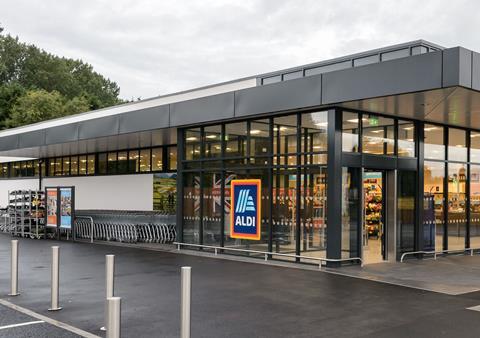Discounter becomes UK’s fourth-largest grocer with market share of 9.3 per cent as shoppers manage shopping budgets amid rising inflation

Aldi has broken into the UK’s top four supermarkets for the first time, relegating Morrisons to fifth spot in terms of market share and bringing to an end the era of the tradtional Big Four.
According to Kantar, shoppers are taking steps to manage their budgets, including broadening the range of stores they visit, with the discount grocers benefiting.
Kantar figures show that Aldi’s sales rose by 18.7 per cent in the 12 weeks to 4 September, reaching a 9.3 per cent market share and making it Britain’s fourth-largest supermarket for the first time ever.
Fellow German discounter Lidl grew sales by 20.9 per cent and its market share increased to 7.1 per cent.
Fraser McKevitt, head of retail and consumer insight at Kantar, said: “Back at the start of the 2010s, Tesco, Sainsbury’s, Asda and Morrisons together accounted for over three quarters of the sector but that traditional Big Four is no more.
“The discounters have seen dramatic sales increases in recent months, bringing more and more customers through their doors. Aldi has done well to expand its shopper base, supported by consistent store openings, and with 14.2 million consumers visiting the grocer in the past three months. Meanwhile, for the fourth month in a row Lidl was the fastest-growing grocer and recorded its strongest sales performance since October 2014.”
Among the other major retailers, Iceland won market share, achieving sales that are 5.8 per cent higher than in 2021, and Tesco, Sainsbury’s and Asda all recorded their best sales performance since April 2021.
Tesco’s market share now stands at 26.9 per cent following a 1.9 per cent boost to sales, while Asda currently holds 14.1 per cent of the market following 2.2 per cent sales growth. Sainsbury’s accounts for 14.6 per cent of the market.
Co-op held its 6.5 per cent market share, while securing a 2.7 per cent increase in sales. Morrisons holds 9.1 per cent of the market, Waitrose has a 4.7 per cent overall share, and online grocery specialist Ocado has 1.7 per cent of the market.
Take-home grocery sales increased by 3.8 per cent in the 12 weeks to 4 September 2022 according to Kantar.
This is the third month in a row that the sector’s sales have grown after over a year in decline as a consequence of comparisons with the pandemic. The rise comes as grocery price inflation hit 12.4 per cent during the past month, a new record based on Kantar’s data.
“It seems there’s no end in sight to grocery inflation as the rate at which food and drink prices are increasing continues to accelerate,” said McKevitt. “Now standing at 12.4 per cent for August, the latest figure means that the average annual grocery bill will go from £4,610 to £5,181 if consumers don’t make changes to what they buy and how they shop to cut costs. That’s an extra £571 a year.
“In what is a fiercely competitive sector, supermarkets are reacting to make sure they’re seen to acknowledge the challenges consumers are facing and offer best value, in particular by expanding their own-label ranges.
“Their efforts seem to be well received by consumers with sales of the very cheapest value own-label products up by 33 per cent this period versus a year ago and nearly one in four baskets containing one of these lines.
“Overall spending on all retailer own-label lines was £393 million higher during the latest four weeks, pushing own labels’ share of the market to 51.1 per cent.”



